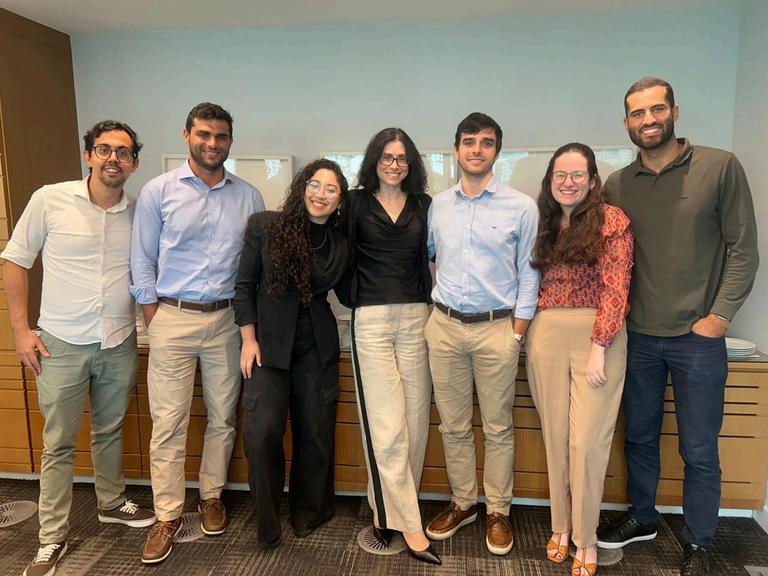LETTER TO THE TEAM

“It is precisely in these “It is precisely in these mistakes and by mistakes and by objectively analysing the objectively analysing the incentives that the incentives that the greatest opportunities lie.” greatest opportunities lie.”
Kym Ardison
Currency Senior PM

Kym Ardison Currency Senior PM
Before joining SPX, I dedicated five years of my life to researching the global hedge fund market - and
this research turned into the main article of my doctoral thesis The result of this analysis is somewhat discouraging for the industry: only 10% of the global hedge fund universe manages to achieve positive and consistent performance over time.
With this in mind, there are two ways of looking at the world. The first, predominant
in academic circles, advocates for resignation: the markets are efficient and it is almost impossible to achieve aboveaverage returns, based on the failure of 90% of professionals who try. The second, to which I subscribe, is that there is a select group of fund managers who deliver consistent returns over time.
Why do I say that a book can change your life? In my case, the book Hedge Fund Market Wizards made me break away from the academic consensus and motivated me to

focus on the 10% who succeed, rather than the 90% who fail
Based on the various interviews with managers in the book, I carry with me relevant takeaways that influence both the way I think about risk management and the way I look at how the main SPX risk takers position themselves over time.
Willingness to leave your comfort zone:
Most people are not willing to take action to be part of the 10% that is successful. Resignation is easier than resilience.
The importance of macro analysis:
It is essential to remember that a country’s most important decisions are often made by a select few who are not always the most qualified or whose interests are not necessarily aligned with the common good (for example, a politician’s goal, more often than not, is to get re-elected) As a result, mistakes in economic management resulting from sub-optimal decisions are more common than one might think It is precisely in these mistakes and by objectively analysing the incentives that the greatest opportunities lie.
One thing that sets SPX apart from others, since I joined the company, is its robust macro team, capable of
monitoring the main global economies and, when opportunities arise, enable us to position ourselves strategically.
The relevance of micro analysis:
Several successful fund managers corroborate that micro analysis is just as important as macro analysis. Market players often only pay attention to micro details when it’s too late - in other words, when the macro effects are already evident I remember an article from my academic years, called Lazy Prices, which showed that, for stocks traded in the US, there is an abundance of relevant information relating to future scenarios included in the risk section of financial statements, but is “ignored” by the market. The study found that a portfolio made up of companies that change their risk scenario, compared to those that keep it stable, can generate an annualized alpha of 22%¹.
The economy is cyclical:
It’s important to keep in mind that the economy goes through cycles. Clear asymmetries and outlandish decisions being made by policy makers won’t always be evident. At such times, the economy tends to follow its natural cyclical course and it is important to
¹ Before anyone rushes off to read the article and replicate it, it’s worth mentioning that once those market “anomalies” become known, the market often tends to arbitrage these excess returns Having said that, the main conclusion here is that if we consistently do our homework, it is possible to beat the average - by a lot

understand the historical dynamics of asset prices throughout the cycles in order to position yourself appropriately for these periods. In other words, in the medium term, economic fundamentals matter and the foundations of each country are what will determine the expected returns for assets throughout the cycle.
I’ll end this letter with two thoughts about SPX that I’d like to share with the younger generation. First, a defining moment in my series of interviews when I joined the company was my conversation with Beny Parnes. Late in the interview, Beny told me “An intern at SPX knows more than you do today” and “Titles don’t matter” (referring to my PhD) - Beny’s main points at that moment were: (i) be humble enough to learn from everyone, and (ii) the best ideas win, regardless of where they come from This brings me to a final observation that I generally like to point out to the younger generation at the company: a substantial part of the company’s board is made up of people who joined the company as interns and/or whose first job in the financial market was at SPX/BBM.
Comment: For those who might not be aware, there is a Brazilian version of Market Wizards called Magos do Mercado and Fora da Curva, where you can find interviews with some of SPX’s senior partners


ME PAR
by HR

In February, we held two Meet the Partners events, hosted by Tiago Fernandes and Marcella Libardoni. We held two breakfasts in Rio de Janeiro, each attended by six employees.
They were excellent opportunities for everyone to share experiences and enjoy a moment of integration and relaxation
yWe had another Meeting with the Partner in London, this time with Leo Cabral, over lunch at Sartoria, accompanied by six employees It was an excellent opportunity to share experiences and connect, reinforcing the importance of dialogue and proximity between the team and the leadership.









